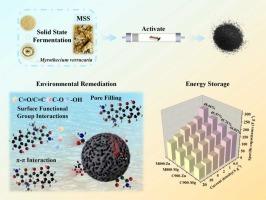Microbial-assisted upcycling of agricultural waste into dual-functional porous carbon for synergistic tetracycline decontamination and sustainable energy storage
IF 6.2
1区 农林科学
Q1 AGRICULTURAL ENGINEERING
引用次数: 0
Abstract
Converting agricultural waste into high-value materials is a promising strategy for concurrent environmental remediation and energy storage. Herein, we report a microbial-assisted route to convert soybean straw into hierarchical porous carbon (designated M800-Zn, where M = Myrothecium verrucaria,800 for 800 ℃ Zn-dual-salt activation). Starting from the raw biochar (SSC, 7.66 m2 g−1, 0.1289 mg g−1 TC uptake), fungal pre-treatment followed by dual-salt activation boosts the BET area 317-fold to 2433.97 m2 g−1 and the tetracycline adsorption capacity 1934-fold to 249.37 mg g−1 (pH 7), surpassing most reported carbons. When assembled into a symmetric supercapacitor, M800-Zn delivered 254.5 F g−1 at 0.5 A g−1 and retained 93.75 % capacitance after 5000 cycles at 2 A g−1. This low-energy, 800 ℃ process (about 100 ℃ lower than conventional activation) thus provides a circular-economy-compatible material that simultaneously purifies antibiotic-contaminated water and sustains high-power energy storage.

微生物辅助农业废弃物升级回收成双功能多孔碳,用于协同四环素净化和可持续能源储存
将农业废弃物转化为高价值材料是一种很有前途的环境修复和能源储存策略。在此,我们报道了一种微生物辅助途径将大豆秸秆转化为分层多孔碳(命名为M800-Zn,其中M =疣状Myrothecium verrucaria,800为800 ℃锌双盐活化)。从生炭(SSC, 7.66 m2 g−1,0.1289 mg g−1)开始,真菌预处理后的双盐活化使BET面积增加了317倍,达到2433.97 m2 g−1,四环素吸附量增加了34倍,达到249.37 mg g−1 (pH 7),超过了大多数报道的碳。当组装成对称超级电容器时,M800-Zn在0.5 a g−1下提供254.5 F g−1,在2 a g−1下循环5000次后保持93.75 %的电容。这种低能量,800 ℃的工艺(比传统的活化低100 ℃)提供了一种循环经济兼容的材料,同时净化抗生素污染的水并保持高功率的能量储存。
本文章由计算机程序翻译,如有差异,请以英文原文为准。
求助全文
约1分钟内获得全文
求助全文
来源期刊

Industrial Crops and Products
农林科学-农业工程
CiteScore
9.50
自引率
8.50%
发文量
1518
审稿时长
43 days
期刊介绍:
Industrial Crops and Products is an International Journal publishing academic and industrial research on industrial (defined as non-food/non-feed) crops and products. Papers concern both crop-oriented and bio-based materials from crops-oriented research, and should be of interest to an international audience, hypothesis driven, and where comparisons are made statistics performed.
 求助内容:
求助内容: 应助结果提醒方式:
应助结果提醒方式:


